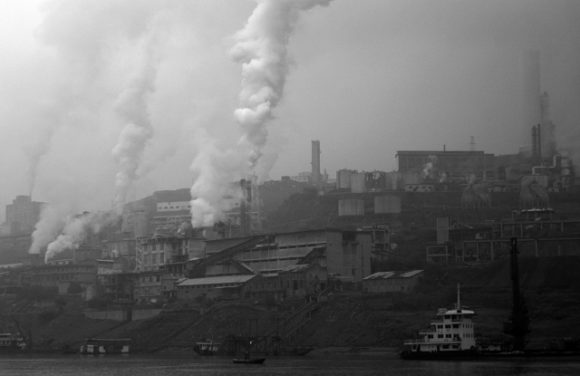 At its worst, the “airpocalypse” that settled over Beijing and northern China in late February had a fine particulate matter reading 16 times the recommended upper limit, turning Beijing into a veritable smoking lounge. Satellite images, a click away on the Internet, showed a massive toxic haze. Farther south, cadmium-tainted rice has been a staple of Guangzhou’s food supply since at least 2009. The dead pigs that floated down Shanghai’s Huangpu River last year were grotesque enough to haunt citizens even in their sleep.
At its worst, the “airpocalypse” that settled over Beijing and northern China in late February had a fine particulate matter reading 16 times the recommended upper limit, turning Beijing into a veritable smoking lounge. Satellite images, a click away on the Internet, showed a massive toxic haze. Farther south, cadmium-tainted rice has been a staple of Guangzhou’s food supply since at least 2009. The dead pigs that floated down Shanghai’s Huangpu River last year were grotesque enough to haunt citizens even in their sleep.
With such scenes as a backdrop, Premier Li Keqiang suitably declared a “war on pollution” at the National People’s Congress (NPC) in early March and outlined an array of targets, policies, and campaigns to address the environmental ills. His pronouncements are just the latest attempt to stay ahead of an issue that could be a grave threat to the leadership’s credibility.
China’s new leaders, including President Xi Jinping, haven’t embraced environmental protection by choice. They’ve been compelled by a new political reality: an informed Chinese public. Throughout 2011 and 2012, American Embassy officials in Beijing measured and tweeted the true levels of hazardous pollutants in the capital. (Twitter (TWTR) is banned in China, but information boomerangs to Sina Weibo, the country’s dominant microblogging platform, and spreads there just as fast.) Soon, the Chinese were demanding that their own government provide similar data. Beijing complied in 2012, and popular pressure to address the scourge of air pollution grew, even as Li sought to tamp down expectations of a quick solution. “There has been a long-term buildup to the problem,” he said in January 2013, “and the resolution will require a long-term process.”
Over the course of the new leadership’s first year in office, however, playing for time has become unfeasible. A July 2013 study found that air pollution in China’s north reduces life expectancy by an average of five and a half years. Water pollution has been linked to increased rates of cancer in almost 500 villages along China’s highly polluted rivers. An analysis by research firm Beijing Zhonglin Assets Appraisal estimates that Beijing’s traffic congestion costs the city about $10 billion a year in lost economic activity and $7 billion in environmental damage. The capital’s tourism industry has also been hit hard by the life-threatening smog, with the number of visitors to Beijing dropping 10 percent in 2013. Overall, environmental degradation and pollution are estimated by the Chinese Academy of Environmental Planning to cost the $9.3 trillion economy the equivalent of 3.5 percent of gross domestic product annually.
Most important, the Chinese people are voting with their feet. Almost two-thirds of the country’s wealthy—those with assets of $1.6 million or more—have left or plan to leave the country, with the environment one of their most frequently cited reasons, according to the Hurun Report, a Shanghai-based wealth research firm. Those who can’t leave are taking to the streets: The environment has surpassed land expropriation as the leading inspiration for the more than 180,000 popular protests each year.
Much of what the leadership has proposed thus far (targets to limit energy consumption, sulfur dioxide emissions, and chemical oxygen demand, a measure of water quality) is simply a continuation of previous environmental efforts. Even a policy to hold local officials responsible for how well they protect the environment—promoted by the Chinese leaders as a new initiative—has been around for decades but never effectively enforced. Sweeping campaigns such as the one Li announced at the NPC to shut down 50,000 small coal-fired furnaces and remove 6 million high-polluting cars and trucks from Chinese roads sound good, but they’ve traditionally fallen well short of their targets. And a policy to relocate China’s most polluting industries to the western provinces neither serves the country’s long-term environmental interests nor advances stability in a politically fraught region.
What are needed are not bold promises but bold structural reforms. Better coordination among the multitude of government agencies and other actors with a stake in environmental policy is at the top of the list. While Beijing has been busy establishing commissions on economic reform, domestic security, and cybersecurity, it desperately needs to restore the State Environmental Protection Commission—an oversight body eliminated during a government reorganization in 1998. Such a powerful supraministerial commission, which would have the power to convene ministries and push for the resolution of environmental problems, is essential to resolving ongoing interagency battles on issues ranging from pollution fees to resource management.
Read more here.
